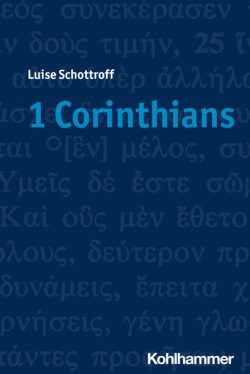Читать книгу 1 Corinthians - Luise Schottroff - Страница 12
На сайте Литреса книга снята с продажи.
1. Paul the Jew
ОглавлениеPaul was born a Jew and lived and worked as a Jew until he died. At the beginning of his work on behalf of the liberating gospel stands his call by God. His call was so important to Paul that he often refers to it in his letters, including in 1 Corinthians (1:1; 15:8–10; 9:1, 16–27 and more often). Through the call he received the divine commission to make the message known, especially among the oppressed nations of the Roman Empire, the ethnē (see on 1:22–24), that the God of Israel has raised Jesus from the dead. Jesus was a Jewish man who was executed by the Romans less than twenty years earlier (see on 1:17–18; 2:6–8). That God has raised this executed one means, according to Paul’s proclamation, that the world is no longer subject to the powers that oppose life. God has fenced in the structures of death. Thereby, God has freed the people of Israel and the nations (ethnē) from slavery (15:20–22). Paul describes this slavery as the power of death (3:22; 15:22, 26, 56), as the power of sin (15:56) and of the world (kosmos 3:22). These powers force people to become accomplices in their injustice and to practice it in their lives, that is, to fail to observe the Torah (6:9–11; 5:10–11). Political analysis and mythical concepts of demonic powers ruling the world flow together here.
With the concept of call, as well as with that of the power of sin, Paul is operating within the traditions of Judaism. Despair over the world-power sin, which enslaves everyone, is, for example, the theme of 4 Ezra (on sin, see the basic information at 9:20). For the tradition in which his call is found, Paul points to the prophetic books (see on 1:1). Only under the influence of the separation of Christianity from Judaism beginning in the second century was this call understood as the beginning of a Christian life freed from the law, that is, as a »conversion.« However, compared with the concept Paul himself uses, this one is not appropriate. Paul did not through his call become a Christian but a divine messenger, who spreads the liberating message of Jesus’ resurrection.
Paul proclaimed liberation from acting unjustly under the power of sin, not liberation from the Torah and the fulfilling of its instructions. So the issue is liberation to the Torah, not from the Torah (see on 7:19–20).
Paul’s First Letter to Corinth as a whole is to be understood as an interpretation of the Torah for people from the nations who have embraced the God of Israel and God’s Messiah. They do not understand themselves as Jewish. From the Jewish side, they are seen as people from the nations (ethnē) and classified among the broad spectrum of non-Jewish people who live in a Jewish manner. However, in Roman-Hellenistic society, and from the perspective of Roman authorities, they were generally treated Jews. The letter is part of the history of the Jewish interpretation of Scripture that unfolds its meaning for the present (halakah; see, for example at 10:1–13; 5:1–11) in the first century.
It was often asked whether Paul, with his concept of the significance of the Messiah Jesus, had already sprung the boundaries of Judaism. Although this is widely assumed, even in his »Christology« Paul remains within the boundaries of Jewish concepts of his time. Decisive for him is the Shema Israel/Hear, O Israel; Israel’s God is one (see 8:5–6). For him, God’s Messiah, with his body and with his whole life, embodies divine action in the world of the people of Israel and of the nations. In his writings there are no attempts to deify the Messiah in any way (see on 8:5–6). »Messiah« is portrayed as an embodied activity on God’s part rather than as an individual person who is distinguished from other people (see on 10:4). The assumption that the word »Messiah,« in its translation into Greek as Christos/anointed one, is in Paul already on its way to becoming a proper name, does not accord with his use of the word. For him it is not a name; when Paul says Christ/Messiah, he is speaking of God’s presence, which frees people from enslavement by the structures of death.
